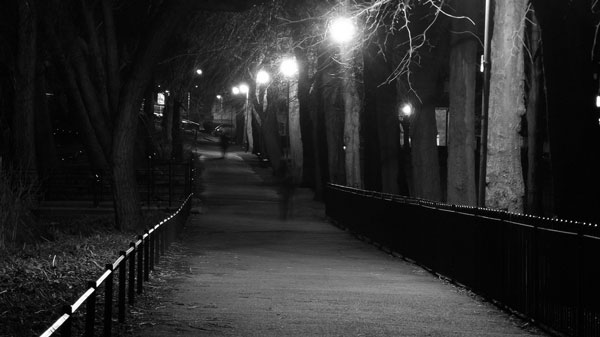
Gabriel Ojeda Sague
PLACES TO WALK OUT TO
I read the note scribbled wildly on torn paper:
“Language is not the signifier nor the signified. It is the significance.”
The only constant is the height of buildings. I hate the way you find things like that and I’ve just now realized it’s the smoke that’s making that taste of oranges in my mouth.
A yellow cat bolts through a black street. I am drunk and swinging through concrete paths, my legs twisting and stumbling, pivoting and sliding.
Billboards sneak into my field of vision.
“For tough cleaning, toughen up with Husky brand paper towels.”
“No more pests with Nomopest bug spray.”
“Feel the fragrance. Be the woman. Rise. Rise, by Vaudlin.”
The night is long and I hate the names of streets.
“Washington St. Mulligan St. Perricone St. Franklin St. Jefferson St. East St. Hawke St. Levi St. 15019 Levi St. 15021 Levi St. 15023 Levi St. 15025 Levi St.”
My house is simple, affordable, and gray. I remember to smell the coriander that I’m growing on my porch. My welcome mat is damp and tattered.
“Robertson Home”
Two weeks before he left, he wrote a poem about my breasts. What a piece of shit. Tits don’t go in books and that bastard will never be published anyway. I sit on the couch avoiding the hole in the fabric where soft cotton or whatever that white stuff is pours out. I pick up the book on the table next to me, one of the books he was reading, titled “Woman” and obviously you can already tell it’s written by a man who is just gonna blab about women who have hurt him even though he loved them so much. It’s the kinda shit John loved to read. I open to a random page:
“The woman is lost,
anger passed down for generations
through brown hair.
She bends like clay
to his touch.”
Of course, well of course she bends like clay and yeah of course the women in her family fuck her up and make her lost and angry, well of course, cause that’s what men write. Men writers. Fuck the crowd of ‘em. I’m too drunk to read anyways, so I slip into my room and without changing fall onto my bed.
◊
Oh god, I should never have gone to Jeremy’s place last night. I was such a mess, saying things I never would say or never should say. I just remember stumbling and I really couldn’t tell you where. My head was in such bad places last night and now just hurts.
The only dishes that are clean are the fine china so I fix myself toast and jam on a ring of swirling blue and I slowly eat. I pick up a book next to me and read from it as brown crumbs slip through my lips.
“Stories erupt. Stories burp. Sentences drip from the ceiling and coat the floor in mixed letters and phrases. A kiln will bend glass. Dear Roma, nobody’s books will give you the day and the water doesn’t move so near you now. You should have them climb out of sewers instead of being pulled from pages. The spine is bending in a kiln. Dissolve that mess of anecdotes you graze off the page, like a cow in a field of grass, and find it again in the air.”
I’ve always thought those books were a way of putting too much pink in the eye, but I’ve been reading this one for a few weeks now. Sunlight hits the window wrong. John left me because he did not have a single clue what he was doing. John left because he doesn’t want to understand the way he is. Or am I just losing myself here?
I see the book he left on the table by the couch. “Woman.” What a title for one of John’s books, that’s the kind of stuff he loves. If it talked about me in there he would close it quick and abandon it. On finishing eating, I place the plate in the sink over a stack of many others covered in dried food. I couldn’t tell you what I was eating four days ago; now it’s just brown chunks. Think, Marianne: what did you eat that could have become brown chunks? Chicken Kiev was Tuesday. Lasagna was Wednesday. John left Thursday. Yeah, it must have been lasagna.
I pick up “Woman” and read from a random page. A prose poem: it’s always hard to find those and really pay attention. And when you do, you inevitably have the question in your mind “well, there weren’t any line breaks or anything, so what’s actually making it poetry?” and god if I could tell you. I’ve never had a knack for classifications.
“She doesn’t remember the way we were in the garden. She doesn’t remember the way I kissed her golden hair and the way the sunligh—”
Jesus, this is awful. Never talk about the sunlight and gold; never. Maybe a different page. There’s got to be a reason he reads this. Another prose poem:
“Devilish walks nowhere and again no-one. I don’t have time for the slip of the thumb or the nailhead. You hit the nail right on the. She doesn’t take a dip of day or slip into old patterns. My lover is really there, but hardly happening.”
I gave the thing too many chances. What trash. Masculinist romanticism. I’ll take it to the church tomorrow for donation.
On Saturdays, I usually take time to go to the gym and go to a museum or something after. I’m getting tired of art, though. Every time I go, I walk so fast through the rooms only reading names of artists and so all the paintings blur together.
“Paul Gauguin. Edgar Degas. Paul Cézanne. Claude Monet.”
So, instead, I decide to just start walking. I get far, even past Jeremy’s house. John always hated the way Jeremy put his laces into his shoes instead of tying them. John and I would probably be arguing now about whose friend Jeremy was first, each giving the other the blame. John left me because he had someone else. John left me because he thought I was too much. John left me because he hated himself. John wouldn’t care if the dishes piled out the windows. If I have a purpose here, it is one of opening.
I am no more today than I was yesterday, but that’s all really getting muddled. He never moved while he was in the house. His friends always commented that he was the quietest sleeper.
Walking farther, I find a crumpled paper on the sidewalk and it reminds me of the note I saw last night. Language is a signified or something? Give it a day and it will come back to me. I pick up the small ball of crushed paper and open it slowly. Frantic scribbles, again. People don’t have time anymore, or at least that’s what everyone keeps saying.
“Dear Darian,
You forgot to pick up the kids again from school. I feel like I’ve said that a thousand times. They waited two hours for you. Do you know what it felt like to get home after work and not find them there? Not find you there? Realizing you had gone again to do the stupid shit you do. They were crying when I picked them up. You can’t explain how a father goes wrong to six year olds. I can’t give you any more chances.
-Molly”
I wonder how the vowels do that. I wonder why the consonants do that to them. “Sentences drip” was it? God, no one has got a clue why I’m walking around this way. If someone could define the word “there” and I mean really tell me what that means and how you can describe “there” I’d be more grateful than I’ve ever been. See that? “not find them there? Not find you there?” If we were translating into, hell, I don’t know, Chinese, that “there” probably couldn’t fit. Allí, là. John hated the way the stairs creaked in e’s and a’s when he walked to get water late at night.
We used to walk down old streets by the river and moss would rub against my heels. I would listen to him spout old nonsense for hours. John left me because he ran out of things to say.
I eventually make my way back home and pick up the first book I see on my shelves, “The Occurrences of Jacques Ponteau.” It’s a book I read at some point in my childhood, one of those adventure books kids read, and I haven’t looked at it in years.
“What was obscure in Jacques eyes was not how he felt about Marie, but what he was going to do next. She stared at him not with fear, but anticipation. Swiftly, he pulls out his blade and places it against her throat. “But Jacques, why?” His only answer is the forgetfulness in his face.”
I pick out another, “The Sewer,”
“When I was just 5 years old, my brother fell into an open manhole. It went so deep it was black inside. My family, so large in number, was relieved by the loss. When I was twenty, I passed by that sewer again and, out of cruel chance, it was open. I peered inside and found a note in a bottle with my name on it. ‘Brother, I am in a world like no other’ it said.”
It’s all places to walk out to. John left a black tie on the chair. He could have at least cleaned up after himself. Even the note he left was messy, everything messy, that’s how he always was and I could never tell you different. When we fought, he said things he didn’t believe and I can’t decide if that was because he went wild with anger or because he believed nothing.
“Your Wickedness”
That’s what is painted on the side of the church; I remember that. I stare at that engraving every Sunday. I remember that. I leave my house again, without a place to go.
“Levi St. Hawke St. East St. Jefferson St. Franklin St. Perricone St. Mulligan St. Washington St. Carrion St. Standing St. 15th St. 14th St. 13th St. 12th St. 11th St. 10th”
What feels like miles and probably is. If I have an agenda, it is one of searching. John is filled with selfishness. Fuck men writers, fuck the lot of ‘em. He wrote a poem about my breasts. Fuck the lot of ‘em.
I walk along the old street by the river the way we used to do. A plane writes along the sky.
“952-555-6809 A NIGHT OF FREE DRINKS AND DANCING. $12 AT THE DOOR”
A poster beside me reads,
“Want to learn a new language? ¿Quiere usted aprender español? Your wait is over! Spanish lessons $20 an hour, twice weekly.”
A red dog sleeps by the water. It’s become night faster than I could have noticed. Woolf said something about wires and electrics, so did Kesey. This is a wired city. Or, to be more specific, the body is stuffed with words and without legs. We put stories on walls and paper to keep them in one place. It is all places to walk out to. Alone, and feeling filled with copper. The brick wall says,
“This will not be televised”
in bending, sprayed letters. John wanted to get in contact with things I have no place in. John left because a red dog sleeps by the water.
I walk further along the river and reach an empty park. Someone has left a small brown book on a bench, ants crawling on the ridges of its pages. I sit and open the book. The words inside are handwritten and it seems like a diary.
“‘Afterwards, showers.’ There you’ve got the same sounds inside of each one and I didn’t make that, Grenier did. What it does to hear that sound again and, to be more specific, to ponder moving sound in such a way. I didn’t want to tell you of the way those sounds come out at us, but nobody was there to tell me otherwise. It’s not that I’m obsessed or crazy, I only think those stories have control of us.
I couldn’t believe how he was then and how he treated me. He couldn’t have loved me a day of his life and so I’ve set myself to writing it instead. If he wouldn’t make a minute for the curve of my hips, then look at the way the letters move.”
Setting the book down again, I look out onto the water. With the way the air sits, I can hear my fingers moving.
 Gabriel Ojeda-Sague is a fiction and poetry writer currently residing in Philadelphia where he studies at the University of Pennsylvania. His work has been published in Apiary and the Daily Pennsylvanian, and in his collection JOGS, a poetic rewriting of the 1977 book The Joy of Gay Sex.
Gabriel Ojeda-Sague is a fiction and poetry writer currently residing in Philadelphia where he studies at the University of Pennsylvania. His work has been published in Apiary and the Daily Pennsylvanian, and in his collection JOGS, a poetic rewriting of the 1977 book The Joy of Gay Sex.
Image credit: byronv2 on Flickr
Read more from Cleaver Magazine’s Issue #5.



